- Home
- Roxane Gay
Bad Feminist: Essays Page 19
Bad Feminist: Essays Read online
Page 19
In one of the books, Ana asks for a glass of “white Pinot Grigio.” Whenever I reconsider that phrase, I die laughing because it is the laziest mistake possible. There is product placement by Audi—Christian drives an Audi, gives his favorite submissives Audis, and gives Ana, over the course of their relationship, two Audis. His generosity truly knows no bounds. Christian gives Ana expensive clothes, La Perla lingerie, a MacBook, an iPad, a BlackBerry, expensive rare books, a honeymoon on a yacht, and on and on. If you have a materialistic fantasy, this book will curb that edge.
Swaths of the story are told via reproduced e-mail exchanges. That is, we literally see the e-mails Ana and Christian exchange, with all the annoying banter you might expect from a couple falling in love and much more. These e-mails, alone, are worth the price of admission.
In the first book, when Christian is trying to introduce Ana to his lifestyle, James reproduces Christian’s Dominant/submissive contract three or four times, as if we couldn’t get the gist the first time. The contract is clearly something James found hanging around the Internet. It dictates all manner of supposedly submissive behaviors including: personal grooming, sleep hygiene, wardrobe, diet, comportment, and sexual activity. An exhaustive amount of the first book is given over to Ana and Christian negotiating this contract, what they each will or won’t do, only Ana never signs the contract so mostly this is a device to repeatedly show us how different the lovers are.
Ana says or thinks “Jeez” more times than I can count. There are so many repetitive tics, this trilogy would be ideal for a drinking game where the aim is to destroy someone’s liver. Drink every time Ana thinks “Jeez.” Drink every time Ana bites her lower lip, which, by the way, makes Christian want to ravish her. Drink every time the palm of Christian’s hand twitches because he wants to spank Ana. Drink every time Ana thinks of Christian as “enigmatic” or “mercurial.” Drink every time Ana reflects on his extraordinary good looks. Drink every time Ana gets possessive of Christian because every single human woman in the world eyes him lustily and becomes instantly tongue-tied. Drink every time the narrative continuity goes wildly off track. The game goes on and on.
To hold all this nonsense together, Ana has two little friends—her subconscious and her inner goddess, each personified. These ladies glare at Ana. They peer at her over their glasses. They twirl and swoon and sigh and grin and nod and otherwise reflect Ana’s state of mind. For example, toward the end of the first book, Christian and Ana are about to get freaky and there’s this gift: “My subconscious is frantically fanning herself, and my inner goddess is swaying and writhing to some primal carnal rhythm. She’s so ready.”
Like Ana’s inner goddess, I was so ready for these books, and that’s an uncomfortable realization, that I can take pleasure in something so terrible. Like most people, I am a mass of contradictions.
There are times when Fifty Shades is amusing because the writing is terrible and fun, and then there are times when the book is terrible and infuriating in its irresponsibility.
As Prince Charming, Christian fits the bill. He is ridiculously wealthy and handsome but utterly lacking in imagination. E.L. James decides to complicate her Prince Charming. She gives the reader a little something more than the average dullard we generally have to yearn for in fairy tales: Christian has a tormented past. His mother is a crackhead, you see, which he casually discloses after a night of kinky passion. Ana is falling asleep next to him, and he says, “The woman who brought me into this world was a crack whore, Anastasia. Go to sleep.” He seems to expect his confession will satisfy Ana’s curiosity, but eventually he begins to disclose his dark past—abuse by his mother’s boyfriends, neglect, hunger. There’s a lot of trauma there and he wears it openly. As you might expect, Christian’s past shapes his present in significant ways and provides a great deal of the incessant drama throughout the books. Forgive my indelicacy, but Christian Grey is a man who loves to run the fuck and he’s not afraid to show it. His need to be a Dominant rises out of his need for control.
In the second book we learn Christian Grey enjoys dominating women, always beautiful brunettes, because they remind him of his mother. He’s working on it with his therapist, Dr. Flynn, who makes the occasional appearance in ways that contradict the tenets of modern psychotherapy. There are any number of reasons why people engage in BDSM, but for James to so flagrantly pathologize the BDSM lifestyle as strictly a way for fucked-up people to work out their emotional issues is beyond the pale. It is not an accurate portrayal of the community. It sends a wrong and unfair message about kink.
The Fifty Shades books have also opened the door for pundits, including Ellen DeGeneres, to treat the BDSM lifestyle with derision, mockery, and outright ignorance. Whips and chains are so very funny, or they are freaky and weird. For those who don’t understand different expressions of sexuality, humor seems to be the easiest coping mechanism—unless, of course, you are critic Katie Roiphe, who concludes that the popularity of Fifty Shades merely proves that independent women today secretly yearn to be dominated by men but are afraid to admit their submissive desires. Roiphe takes her typical anti-feminist stance by supporting her argument with an odd range of vaguely related texts. Take Secretary and The Story of O and a few other cultural artifacts, et voilà: irrefutable proof that women want to surrender sexually. At no time does Roiphe actually speak to submissive women about their desires. At no time does she try to understand the complexity of submissive sexual desire, instead making a tenuous connection between a popular, highly fictional series of books and the state of modern female sexuality.
Very little of the conversation about Fifty Shades has included people who actually participate in the BDSM lifestyle and can speak intelligently and ethically on the subject, even though these people exist and are easy to find. Instead, people who know not of what they speak have made wild, lazy, insulting, or inaccurate conjectures about BDSM all because a writer who is not terribly familiar with the lifestyle (she did a lot of online research, don’t you know) thought kink would be a nice hook to hang her Twilight fan fiction on.
My amusement with the Fifty Shades series only goes so far. The books are, essentially, a detailed primer for how to successfully engage in a controlling, abusive relationship. The trilogy represents the darkest kind of fairy tale, one where controlling, obsessive, and borderline abusive tendencies are made to seem intensely desirable by offering the reader big heaping spoonfuls of sweet, sweet sex sugar to make the medicine go down.
We can certainly credit the source material. Twilight offers similar instruction. Edward goes to absurd lengths to control Bella, all in the name of love. In Fifty Shades, there are no limits to Christian’s need to control Ana’s life, her decisions, and their relationship. Even before they date, he conducts a background check. He tracks her movements via her cell phone in a way that is never quite explained but that we’re supposed to go along with because he is wealthy and stalking people electronically is simply what wealthy people do. He tries to control when and how much Ana eats, the kind of alcohol she drinks, how she behaves around him, whom she allows in her life, how she travels, and we’re supposed to believe this is all fine because he has issues, because he loves her.
In addition to the highly restrictive contract Christian wants Ana to sign, he also makes all his submissives sign a nondisclosure agreement limiting what Ana is even legally allowed to share with her friends and loved ones about her life with Christian. Ana inexplicably signs this agreement because, as she tells Christian, she wouldn’t have said anything anyway. She’s a good girl. That’s a common tactic of abusers—isolating their victims—but we’re supposed to think the way Christian isolates Ana in luxury is romantic. A prison is still a prison even when the sheets are 1200 thread count, but the premise, in my weaker moments, is seductive enough to make that prison seem tolerable.
In the first book, Ana decides to visit her mother in Georgia. Christian offers to travel with Ana, but she refuses because she, understandab
ly, needs a little time and space to clear her head so she can decide if the BDSM lifestyle is one she can handle. Christian has to have some control over the situation so he upgrades her to first class. We’re supposed to think this is romantic, but mostly it’s creepy because he has gone to the trouble of figuring out her itinerary and changing it without consulting her. Then he simply flies down to Georgia to join Ana because he cannot bear to be apart from her. He’s a man who knows what he wants; his needs are the only needs that matter.
As the story proceeds, Christian is jealous when Ana is merely in the presence of another man. He gets angry or pouts when she won’t pay enough attention to him. During a visit to his family’s home, Ana defies Christian in some obscure way so he drags her off to the boathouse to punish her. Her first instinct is to whisper, “Please don’t hit me.” This fear of being hit will come up more than once throughout the trilogy. He hires a security detail for her after one of his “crazy” (read: “heartbroken”) former submissives has a mental breakdown after her boyfriend dies, but mostly it’s an opportunity for him to control the boundaries of Ana’s world in every possible way. When Ana gets a job, Christian buys the company where she works to “protect” her. In the third book, on their honeymoon, Ana decides to sunbathe topless at a nude beach. Christian, of course, does not appreciate his woman revealing herself to the world. She’s not his submissive, but by God, she is his wife. He makes a scene. Later, they are making love in their hotel room and he leaves hickeys all over her breasts so not only can she no longer go topless, she cannot even wear a bikini top for the duration of their honeymoon. He literally marks his territory like a sixteen-year-old boy.
Christian Grey uses sex as a weapon. He takes real pleasure in fucking her into submission when he cannot otherwise will her into submission. Nearly every sexual encounter between the young couple ends with Ana drowsy and unable to move, her limbs heavy and satiated with pleasure. In a consensual BDSM relationship this dynamic would be fine, welcome even, but the overarching premise of the trilogy is that Ana doesn’t want a BDSM relationship, at least not the kind Christian wants. She certainly enjoys their kinky sexual relationship, but she consistently clarifies her overall disinterest in serving as Christian’s submissive. Their relationship is beyond refractory; Ana is, like Bella in Twilight, the vanquished, the undead, and Christian Grey is the proud vanquisher.
After each instance of abusive, controlling behavior, Ana gets righteously indignant but never for long. Time and again, she chooses to sacrifice what she really wants for the opportunity to be loved by her half-assed Prince Charming. We’re supposed to believe Ana is independent because she “defies” Christian by having very reasonable expectations and boundaries. He willfully ignores these boundaries, though, and she allows him to. She forgives all his trespasses.
The trilogy also relies heavily on the trope of the imperiled woman—in each book, Ana faces some kind of danger, either innocuous or quite serious, that reminds us she is a woman, and therefore in need of rescue by her Prince Charming. After each crisis, Christian clutches Ana desperately and says he doesn’t know what he would do if anything happened to her. If you look up the word “codependent” in the dictionary, this couple’s picture will be featured prominently.
I’m all for reading for pleasure. I’m a fan of dirty books and kink. I am down with female submission. By the end of Fifty Shades Freed, however, where Ana acknowledges that Christian is as controlling as ever even though they have found a happily-ever-after, his pattern of abusive, petty, and at times childish behavior is exhausting and far too familiar. This Prince Charming has lost all his charm.
When considering the overwhelming popularity of this trilogy, we cannot simply dismiss the flaws because the books are fun and the sex is hot. The damaging tone has too broad a reach. That tone reinforces pervasive cultural messages women are already swallowing about what they should tolerate in romantic relationships, about what they should tolerate to be loved by their Prince Charming.
Fifty Shades is a fairy tale. There’s a man and a woman, and an obstacle that eventually they are able to overcome. There is a happily-ever-after, but the price exacted is terribly high. It is frightening to consider how many women might be willing to pay that price.
[RACE & ENTERTAINMENT]
The Solace of Preparing Fried Foods and Other Quaint Remembrances from 1960s Mississippi:
Thoughts on The Help
When my brothers and I have a particularly frustrating day with white people, we’ll call one another and say, “Today is a Rosewood day.” Nothing more needs to be said. Rosewood is set in 1923 and tells the story of Rosewood, a deeply segregated, primarily black town in Florida. A married white woman in nearby Sumner is beaten by her lover. With no other way to explain the marks on her body to her husband, she cries rape, and when the townsmen ask her who has done this terrible thing, the white woman, predictably, shrieks, “It was a nigger.”
The white men proceed to lose their minds, surrender to a mob mentality, and create a lot of havoc, lynching an innocent black man and tormenting the townsfolk of Rosewood. The angry mob destroys nearly every home and other structure in the town. There are some heartbreaking subplots, but mostly the story hinges on a little white lie, so to speak. It’s all very distressing, and the injustice of what happened in Rosewood is, at times, unbearable because it is based on a true story. The first time I saw Rosewood, I turned to my friend and said, “I don’t want to see a white person for three days.” She said, “That’s not fair,” but she was white so that was to be expected. Fortunately, it was a Friday, so I locked myself in my apartment and by Monday I was mostly ready to reengage with the world.
If Rosewood demands a three-day window of voluntary segregation, The Help demands three weeks, maybe longer.
Watching historical movies about the black experience (or white interpretations of the black experience) have become nearly impossible for the same reason I hope I never read another slave narrative. It’s too much. It’s too painful. Too frustrating and infuriating. The history is too recent and too close. I watch movies like Rosewood or The Help and realize that if I had been born to different parents, at a different time, I too could have been picking cotton or raising a white woman’s babies for less than minimum wage or enduring any number of intolerable circumstances far beyond my control. More than that, though, I am troubled by how little has changed. I am troubled by how complacently we are willing to consume these often revisionist stories of this country’s complex and painful racial history. History is important, but sometimes the past renders me hopeless and helpless.
When I first saw the trailer for The Help, I was not familiar with the book. The moment I saw the first maid’s uniform grace the screen, I knew I was going to be upset. By the end of the trailer, which contained all the familiar, reductive elements of a movie about the segregated South, I had worked myself into a nice, frothy rage. In the following months, I continued to see the trailer, only now it was plastered all over the Internet and on television, and the reprinted tie-in book version was heavily hyped, even climbing back to the top of the Amazon bestseller list because this is one of those books nearly everyone seems to love. After seeing the movie, I borrowed the book from a friend, read it, and raged more.
The Help is billed as inspirational, charming, and heartwarming. That’s all true if your heart is warmed by narrow, condescending, mostly racist depictions of black people in 1960s Mississippi; overly sympathetic depictions of the white women who employed the help; the excessive, inaccurate use of dialect; and the glaring omissions with regards to the stirring civil rights movement in which, as Martha Southgate points out in Entertainment Weekly, “white people were the help”: “the architects, visionaries, prime movers, and most of the on-the-ground laborers of the civil rights movement were African-American.” The Help, I have decided, is science fiction, creating an alternate universe.
Hollywood has long been enamored with the magical negro—the insertion of
a black character into a narrative who bestows upon the protagonist the wisdom he or she needs to move forward in some way—or, as Matthew Hughey defines the phenomenon in a 2009 article in Social Problems,
The [magical negro] has become a stock character that often appears as a lower class, uneducated black person who possesses supernatural or magical powers. These powers are used to save and transform disheveled, uncultured, lost, or broken whites (almost exclusively white men) into competent, successful, and content people within the context of the American myth of redemption and salvation.
(See: Ghost, The Legend of Bagger Vance, Unbreakable, Robin Hood: Prince of Thieves, The Secret Life of Bees, Sex and the City: The Movie, The Green Mile, Corrina, Corrina, etc.)
In The Help, there are not one but twelve or thirteen magical negroes who use their mystical powers to make the world a better place by sharing their stories of servitude and helping Eugenia “Skeeter” Phelan grow out of her awkwardness and insecurity into a confident, racially aware, independent career woman. It’s an embarrassment of riches for fans of the magical negro trope.
The theater was crowded for the screening of The Help I attended. Women came in groups of three or four or more, many of them clutching their well-worn copies of the book. As we waited for the movie to start, and a long wait it would be because the projector was malfunctioning (a sign perhaps), I listened to the women around me, certainly well meaning, many of them of the Golden Girls demographic, chattering about how much they loved the book and how excited they were and how long they had been waiting for this movie to open. I wondered if they were reminiscing about the good old days, then decided that was unfair of me. Still, they were quite enthusiastic. My fellow moviegoers applauded when the movie began, and they applauded when the movie ended. They applauded during inspiring moments and gasped or groaned or clucked their tongues during the uncomfortable or painful moments. Their animated response to the movie was not mild. My faith in humanity was tested. I was the only black person in the theater, though to be fair, that mostly speaks to where I live. As I walked to my car, I came to the bitter realization that The Help would make a whole lot of money and be really well received by many.

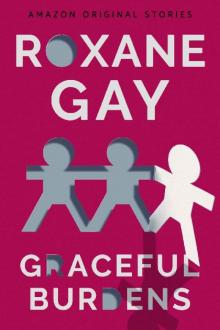 Graceful Burdens (Out of Line collection)
Graceful Burdens (Out of Line collection)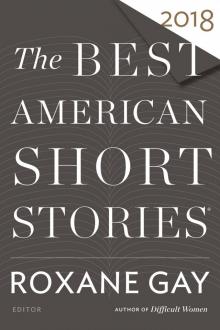 The Best American Short Stories 2018
The Best American Short Stories 2018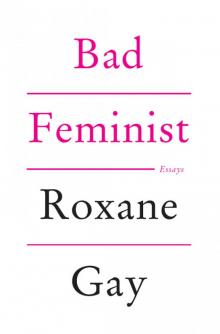 Bad Feminist
Bad Feminist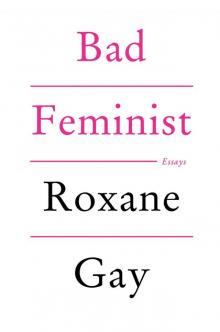 Bad Feminist: Essays
Bad Feminist: Essays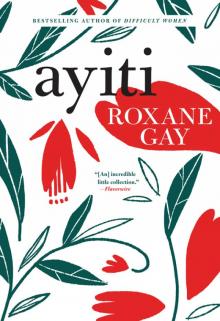 Ayiti
Ayiti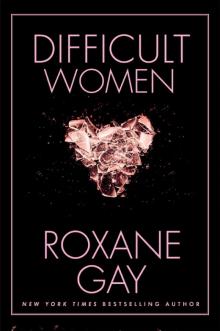 Difficult Women
Difficult Women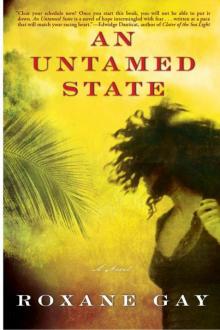 An Untamed State
An Untamed State Hunger
Hunger